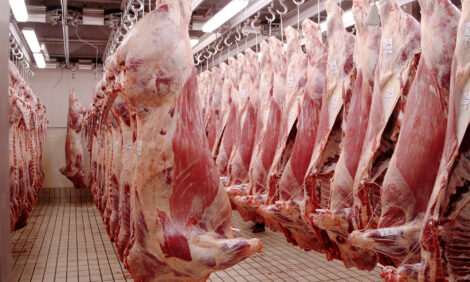



BSE Found in Beef Cow in Alberta
CANADA - A case of BSE has been found in a beef cow from Alberta in Canada.The Canadian Food Inspection Agency immediately launched an investigation and is working closely with provincial and industry partners.
The CFIA said that no part of the animal's carcass entered the human food or animal feed systems.
The Canadian Cattlemen’s Association said that the case is an isolated incident.
Canada's last confirmed BSE case was reported in 2011.
This latest case was detected through the national BSE surveillance programme, which, the CFIA said, continues to play an important role in Canada's strategy to manage BSE.
As part of the investigation, the CFIA is seeking to confirm the age of the animal, its history and how it became infected.
The investigation will focus in on the feed supplied to this animal during the first year of its life.
The Agency will also trace out all animals of equivalent risk. Equivalent risk animals will be ordered destroyed and tested for BSE.
Bovine spongiform encephalopathy BSE is a progressive, fatal neurological disease in cattle.
Canada remains a "controlled BSE risk" country, as recognized by the World Organisation for Animal Health (OIE). Accordingly, this case should not affect current exports of Canadian cattle or beef.
The case will be reported to the OIE, in line with Canada's international obligations and our commitment to transparency. It will be reported on the CFIA website, as part of the Agency's monthly reportable diseases update.
The Canadian Cattlemen’s Association said: “Canada’s beef cattle industry takes Bovine Spongiform Encephalopathy (BSE) surveillance seriously.
“The finding of a case of BSE in beef cow in Alberta, while unfortunate, demonstrates the robustness of the National BSE Surveillance Program Canada has in place.
“BSE is on the decline in Canada and globally.
“It is not unexpected for cases to be found as efforts continue around the world to eradicate classic BSE.
“This is an isolated case; Canada’s previous confirmed BSE case was reported in 2011.
“The CCA subscribes to the World Organisation for Animal Health’s (OIE) science-based rules for trade.
“This finding will not impact Canada’s controlled risk status under the OIE achieved in 2007 and current exports of Canadian cattle and beef should not be impacted. Canadian beef gained this status due to Canada’s effective BSE surveillance, mitigation and eradication measures.
“This categorisation allows for the safe trade in beef from cattle of all ages under conditions which Canada meets.
“The CCA has complete confidence in the Canadian Food Inspection Agency (CFIA) and the investigation underway.
“No part of the animal's carcass entered the human food or animal feed systems which are consistent with Canada’s control measures in place since 2003 and 2007, respectively.”
TheCattleSite News Desk


